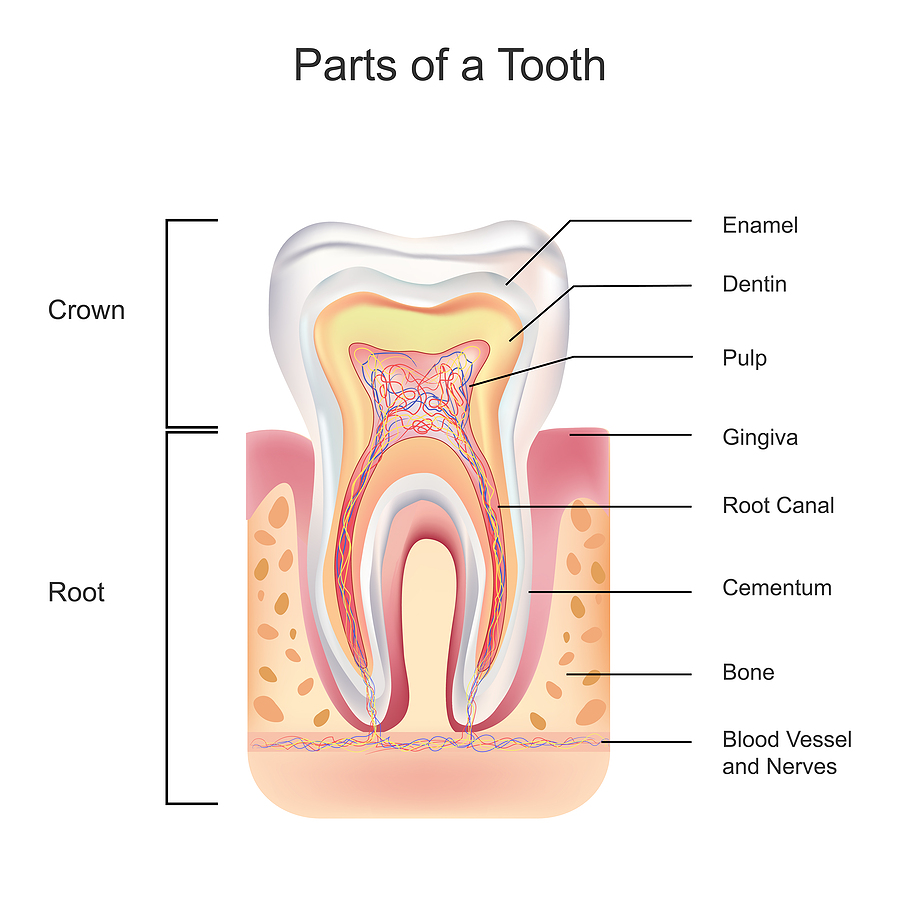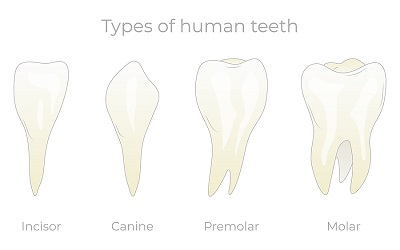Our teeth play a big role in our appearance. A beautiful smile can exude confidence, and a healthy set of teeth can boost your self-esteem and overall health. Teeth are an integral part of helping you chew your food easily. They can also help you pronounce certain words correctly.
Anatomy of a Tooth

The top portion of the tooth is called the crown. The portion below the gum line is the root. The pulp chamber is between the crown and root, where the nerves and blood vessels that supply the tooth are located. A layer of enamel covers the root of the tooth. Enamel comprises calcium and phosphate salts, which are minerals that strengthen teeth.
Underneath the enamel is dentin, which is less dense than enamel and softer, so it can absorb pressure from chewing and biting. Dentin comprises collagen fibers and mineral deposits such as carbonate, calcium phosphate, magnesium, sodium, and potassium.
Located inside the dentin is a soft tissue called the pulp. Pulp mostly comprises nerve tissue, lymph vessels, and connective tissue. It’s what gives your tooth sensitivity, temperature, and taste.
Types of Teeth
There are different types of teeth. They are categorized based on shape, size, and structure.

Incisors
Your incisors are your front teeth, which you use for biting and chewing food. They are also the teeth that show when you smile!
Canines
Also known as cuspids, canines are pointed teeth toward the front of the mouth in the upper and lower jaws. Due to their shape, these teeth are primarily used for tearing food into smaller pieces rather than biting or chewing it.
Premolars
Both premolars have one pointed cusp and are used to grind food during chewing, especially in the back of the mouth. They are the most common teeth to be extracted during orthodontic treatment because they are often used for chewing. If a tooth is lost due to decay or trauma, the neighboring molars often shift toward the gap and become misaligned over time.
Molars
Molars are one of the three primary types of teeth in mammals, including humans. These flat-back teeth are also described as the “grinding” teeth because they grind food against the molars of other teeth to break them down into small enough pieces to swallow them. The molars are also used to chew tough foods like meat and fibrous vegetables like carrots.
Overall Health: Dental Emergencies That Affect Teeth
A dental emergency refers to any situation that requires immediate treatment. This situation can be caused by various things, including sports injuries or impact to the face or mouth, but they can also occur for seemingly no reason. A dental emergency can be painful, but seeking treatment as soon as possible is important. Here are a few of the most common dental emergencies we come across:
Toothache: A toothache usually indicates needing a filling, crown, or other dental treatment. It’s often a sign of infection or decay and must be addressed immediately to prevent further damage and improve overall health. Call your dentist today for a diagnosis and effective treatment recommendations. Here are some other common symptoms that indicate you need to call a dentist right away.
Knocked-out Tooth: If you’ve lost a tooth, the best thing to do is try to find the lost tooth and put it back in its place as quickly as possible. If this isn’t possible, place the tooth in a clean container or plastic bag with milk or water to keep it moist until you can get to a dentist’s office. Do not try to force the tooth back into the socket. Instead, please place it in the side of your mouth between your cheek and gums, keep it in water or milk, and see your dentist as soon as possible.
Here is a link to an interesting podcast that shares the story of Ryanne Jones’ friend who accidentally hit her in the mouth with a hammer.
Chipped Tooth: A chipped tooth may seem relatively minor but can cause discomfort while chewing or eating. In some cases, when a tooth is chipped, it may even cause a sharp pain radiating to the jaw and gums and overall health. If you experience any of these symptoms after chipping a tooth, visit a dentist immediately for an evaluation.
If you wish to learn more, visit Cedar Creek Dental, Office of Dr. Phil Han, at 11786 SW Barnes Rd #360, Portland, OR 97225, or call (503) 646-1811.



























